Facebook addiction symptoms, causes, and effects
Table of content
- What is Facebook addiction?
- What are the causes of Facebook addiction?
- What are the effects of Facebook addiction?
- What are the signs and symptoms of Facebook addiction?
- How to overcome Facebook addiction?
- What are the risk factors for Facebook addiction?
- How do you treat Facebook addiction?
- What other social media platforms can cause addiction?
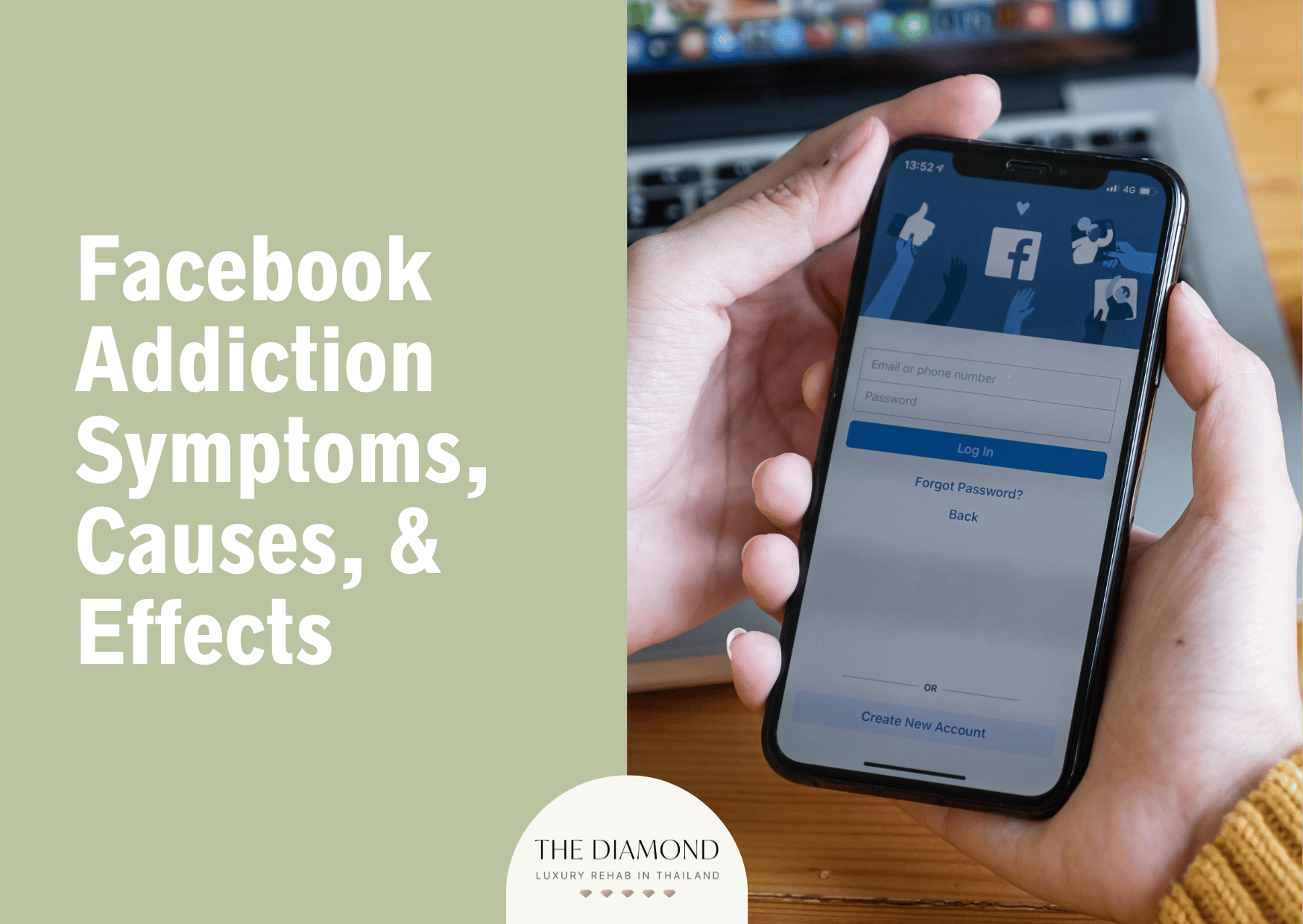
Facebook addiction refers to the compulsive use of the social media platform, Facebook, which negatively affects an individual’s physical, mental, and social health and well-being. Facebook addiction is characterized by symptoms including excessive use of the platform; using it as a means to cope with real-life problems, and returning to the platform to boost mood and self-esteem. A person with Facebook addiction often neglects their responsibilities and problems in favor of social media presence.
The causes of Facebook addiction can be biological, social, and psychological. Underlying mental health problems such as anxiety and depression can significantly contribute to the development of Facebook addiction. Additionally, the lack of cohesiveness at home can be a contributing factor.
The effects of Facebook addiction are exhibited in the social, mental, and physical well-being of an individual which leads to various issues such as social detachment, problems with relationships, decreased productivity at work or school, and worsening of underlying physical and mental health issues.
What is Facebook addiction?
Facebook addiction is a type of behavioral addiction associated with the compulsive use of Facebook regardless of the consequences it causes. While not formally recognized as an addiction, this is a serious problem due to the widespread use of the social media platform. A person with Facebook addiction spends most of their time on this platform and tends to use it as an escape mechanism from problems in real life.
What are the causes of Facebook addiction?
The causes of Facebook addiction belong to three categories listed below.
- Biological causes: excessive Facebook use may influence the brain’s reward system and induce pleasurable emotions that users want to emulate. Excitatory synapses in specific brain regions are activated when social media users receive positive feedback. Particularly, dopamine receptors, one of the neurotransmitters responsible for the reward pathways of the brain, are activated leaving the user feeling good while stimulating the body’s reward system. Dr. Anna Lembke, a psychiatry professor and Chief of the Addiction Medicine Dual Diagnosis Clinic at Stanford University, further explains that due to repeated exposure and short-term dopamine-induced feedback mechanisms, a person finds it necessary to use Facebook more often just to experience the same effects. This leads to dependence and eventually, addiction.
- Psychological causes: low self-esteem and confidence, and certain personality traits such as neuroticism and narcissism could be behind the development of Facebook addiction. In his 2014 article published in the Cyberpsychology Behavior and Social Networking journal, Dr. Igor Pantic of the University of Belgrade explains that individuals who have lower self-esteem tend to become more active online by creating and posting self-promotional content on their social media profiles. Moreover, a person is more likely to develop addiction if they have underlying mental health problems such as anxiety and depression. According to a 2022 research by Jin Zhao et al. published in the Frontiers in Psychology, anxiety can drive individuals to turn to social media, such as Facebook, to cope with emotions by pursuing attention, support, or validation online.
- Social or environmental causes: lack of family cohesiveness can contribute to the development of internet addiction, including Facebook addiction. According to a 2019 article by Sulki Chung et al., published in the International Journal of Environmental Research and Public Health, a lack of structure in the family can pave the way to problematic Facebook use. Also, addiction to this platform can occur in persons with a history of addictive behaviors, or when a person spends a lot of time with other people exhibiting problematic Facebook use.
What are the effects of Facebook addiction?
The effects of Facebook addiction can be physical and psychological, which is why this type of addiction has a detrimental impact on a person’s quality of life. The biggest effects of Facebook addiction are listed below.
- Physical effects: burning eyes, disturbed sleep patterns, and headaches are the most common negative physical effects of excessive Facebook use as reported by Rajesh Kumar Jhan et al., in their 2016 study published in the BMC Research Notes. Facebook addiction can also manifest in musculoskeletal health problems such as back pains, shoulder pains, and wrist pains and poorer physical health outcomes brought about by spending hours using the platform as reported by Kwaku Oppong Asante and Jacob Nyarko in their 2014 paper published in Mediterranean Journal of Social Sciences.
- Psychological effects: anxiety, depression, low self-esteem, and lack of confidence are among the strongest psychological effects of Facebook addiction. Anxiety, particularly social anxiety, represents the strongest significant risk of social media addiction, including Facebook addiction, as reported by Jin Zhao et al. in their 2022 research published in the Frontiers in Psychology. Other psychological effects may include intensified loneliness, envy and jealousy, and resentment.
- Short-term effects: spending a considerable amount of time using social media platforms, such as Facebook, can cause neglect of actual social interactions and important responsibilities. This can ultimately lead to a negative decline in one’s quality of life that can disrupt performance at work or school, as Lei Zhao of the Hefei University of Technology in China explains in a 2021 analysis published in Computers in Human Behavior Reports.
- Long-term effects: worsening anxiety and depression, suicidal thoughts and tendencies, strained relationships, and worsening of physical health due to lack of sleep are among the long-term effects of Facebook addiction. It can similarly lead to result in salience, tolerance, mood mediation, relapse, withdrawal, and conflict, which all have a huge adverse impact on an individual’s life and overall well-being, Lei Zhao adds in his 2021 analysis published in Computers in Human Behavior Reports.
What are the signs and symptoms of Facebook addiction?
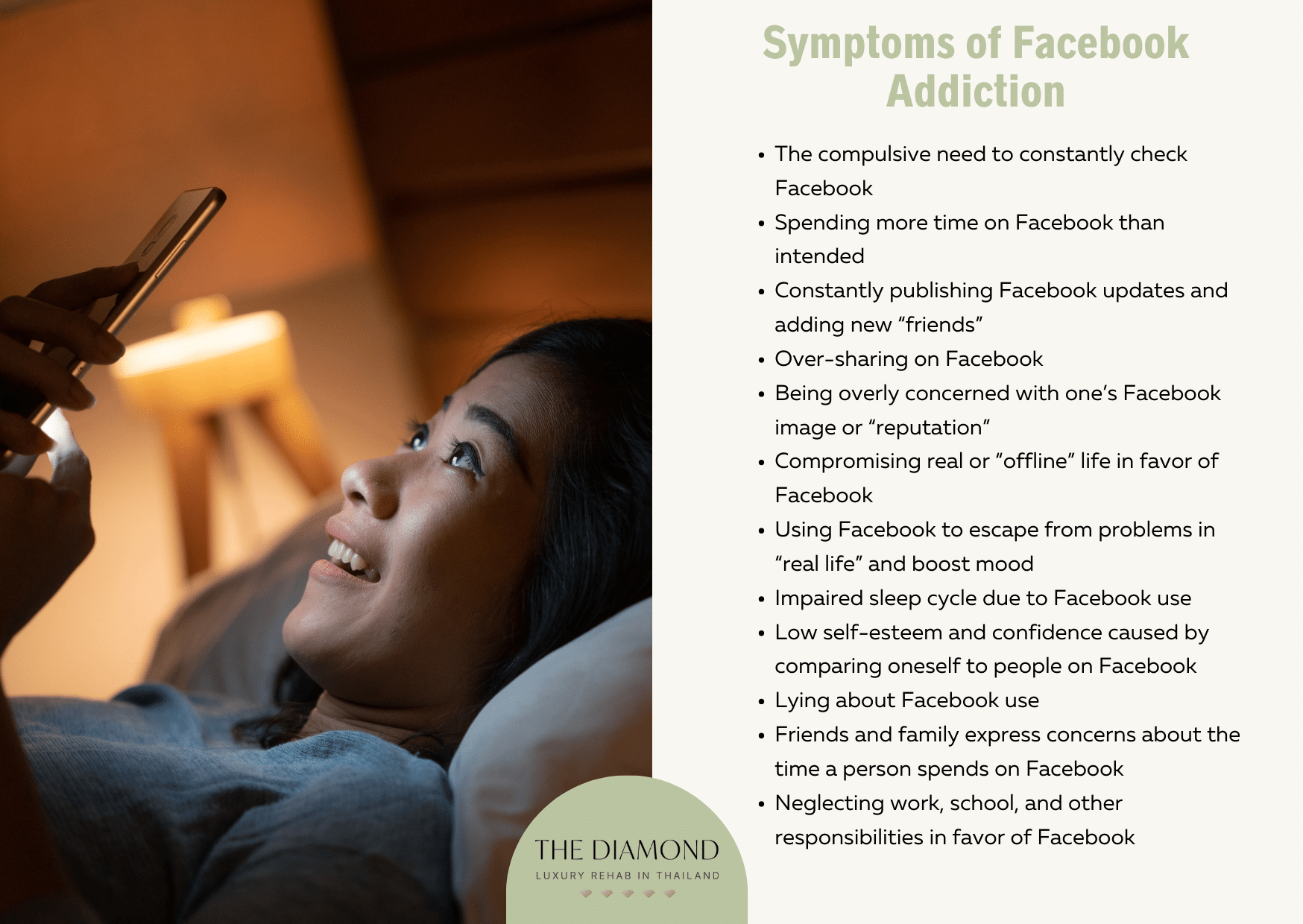
Signs and symptoms of Facebook addiction include:
- The compulsive need to constantly check Facebook
- Spending more time on Facebook than intended
- Constantly publishing Facebook updates and adding new “friends”
- Over-sharing on Facebook
- Being overly concerned with one’s Facebook image or “reputation”
- Compromising real or “offline” life in favor of Facebook
- Using Facebook to escape from problems in “real life” and boost mood
- Impaired sleep cycle due to Facebook use
- Low self-esteem and confidence caused by comparing oneself to people on Facebook
- Lying about Facebook use
- Friends and family express concerns about the time a person spends on Facebook
- Neglecting work, school, and other responsibilities in favor of Facebook
- Showing up late at meetings and other arranged events due to Facebook use
- Unsuccessful attempts to limit Facebook use
- Frustration and irritability when unable to use Facebook
Facebook addiction manifests itself through a multitude of symptoms affecting a person’s mental health and quality of life. Other possible symptoms of Facebook addiction are listed below.
- Poor mental health
- Problems with work
- Strained relationships
- Strong urge to use Facebook to escape stressful situations and bad moods.
Is Facebook addiction good or bad?
Facebook addiction is bad. The term addiction points to unhealthy and compulsive thoughts, activities, and behaviors. In this case, Facebook addiction refers to the unhealthy and damaging use of this platform.
Numbers show that as of January 2023, Facebook has around almost three billion monthly active users. As of January 2023, Statista, an online platform specializing in market and consumer data, reports that around 12.3% of total active Facebook users were females aged between 25 and 34. At the same time, men between the ages of 25 and 34 account for the biggest demographic on this social media platform.
The negative effects of Facebook addiction revolve around impaired physical, social, and mental health and well-being. On the other hand, positive effects could cover the social connections and entertainment aspect of social media use, as reported by Lei Zhao in a 2021 paper published in the Computers in Human Behavior Reports.
What are some of the warning signs of Facebook addiction?
The warning signs of Facebook addiction are listed below.
- Checking Facebook first thing in the morning and the last thing before going to sleep
- Spending a lot of time on Facebook during working hours
- Constantly checking whether new posts have received likes or comments
- Spending a lot of time overthinking and planning new Facebook updates
- Being upset when family or friends don’t like or comment new Facebook update
- Checking phone every few minutes for any notification on Facebook
- Strong need to post Facebook updates about everything during the day
- Finding Facebook more interesting and exciting than real life
How to overcome Facebook addiction?
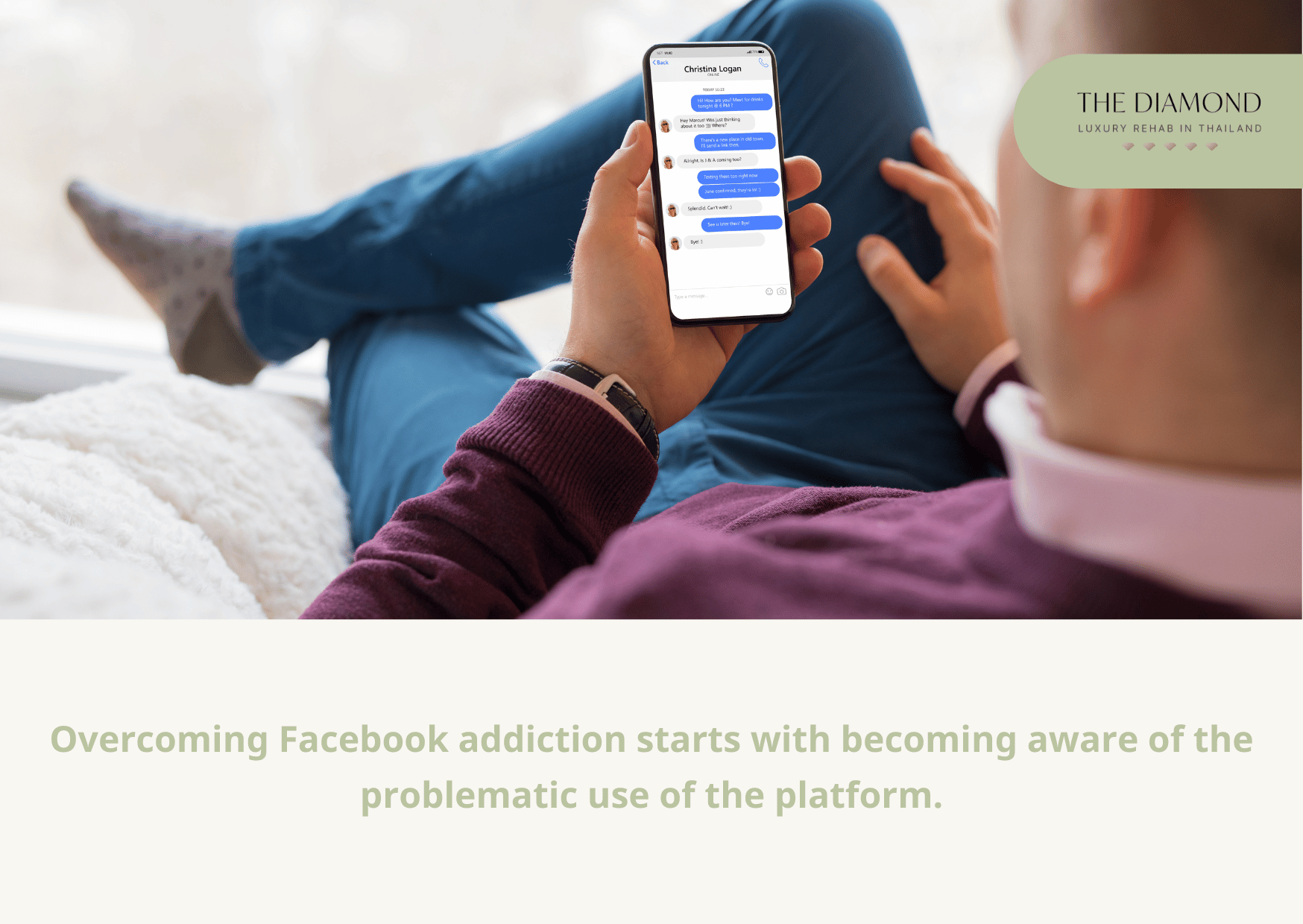
Overcoming Facebook addiction starts with becoming aware of the problematic use of the platform. Although it may sound common, to overcome this type of addiction a person needs to acknowledge they have a problem first. Additionally, it is important to be aware of the purpose of an individual’s use of Facebook to determine whether it aligns with how they value spending their time.
An effective approach to overcoming Facebook addiction is through restriction. If a person finds that Facebook use is not a valuable means to spend their time, there are certain techniques to address it. The first step is to monitor the number of hours spent using Facebook. Social media apps or platforms, such as Facebook, offer a feature that allows users to track activities and screen time spent on such platforms. This can also help a person evaluate their Facebook use and acknowledge problematic use.
In addition to screen time tracking, it is important to take proactive measures to lessen the amount of Facebook use. An effective technique involves utilizing the screen time feature of smartphone devices, which allows setting limits on the amount of time spent on the Facebook app and restricting activities when that particular limit is reached. The Facebook app similarly offers the same feature by turning on the ‘Quiet Mode’ feature or using the ‘Daily Time Reminder’ option. This can be done by accessing the Facebook app’s ‘Your Time on Facebook’ setting under ‘Settings and Privacy’. Through here, Facebook screen time can be tracked, and time is managed by creating a screen time limit or regulating notifications and engagements through ‘Quiet Mode’.
Another strategy that helps overcome Facebook addiction is to avoid using the phone in bed, car, or during work, unless it’s necessary. Taking a short break (deactivating) from Facebook is also helpful.
For some people deactivating their profile is too drastic, so instead, they can focus on gradually reducing time spent on the platform. Strive to reduce Facebook use by logging in less frequently.
Paying attention to emotions and feelings during Facebook use also aids in the recovery process. Many people use Facebook without realizing how it makes them feel. For example, some men and women use Facebook to improve their mood but aren’t aware it makes them feel worse later on. With an understanding of how Facebook use affects emotions, it becomes easier to take a step back and reduce time spent on the app.
Distraction is always a practical tool in overcoming some types of addiction, including Facebook addiction. According to a 2023 paper by Xiangyu Wu published in SHS Web of Conferences, individuals can engage in more meaningful activities as useful distractions such as yoga, meditation, hiking, cooking, sketching, reading, writing, exercising, and other healthy activities, and spending time with their families.
A strong support system is also important for overcoming Facebook addiction the same way it is in combating any other addiction. According to a 2014 study by B. Satici et al., published in Studia Psychologica, developing intervention programs that involve psychotherapy groups and group counseling to support individuals who suffer from psychological distress are proactive means to prevent Facebook addiction.
What are the risk factors for Facebook addiction?
The risk factors for Facebook addiction are listed below.
- Social and emotional loneliness i.e. physical or emotional distancing from friends, family, significant others
- Difficulties to relate socially
- Presence of mental health problems such as anxiety, depression, PTSD
- Family history of addiction
- Peer pressure to keep using Facebook and maintain “image” on the platform
- Lack of family structure and involvement
- Lower life satisfaction
- Narcissism and neuroticism
- Being female
- Being between 24 and 30 years old
- Lower differentiation of self
- Negative communication patterns with parents and others
How do you treat Facebook addiction?
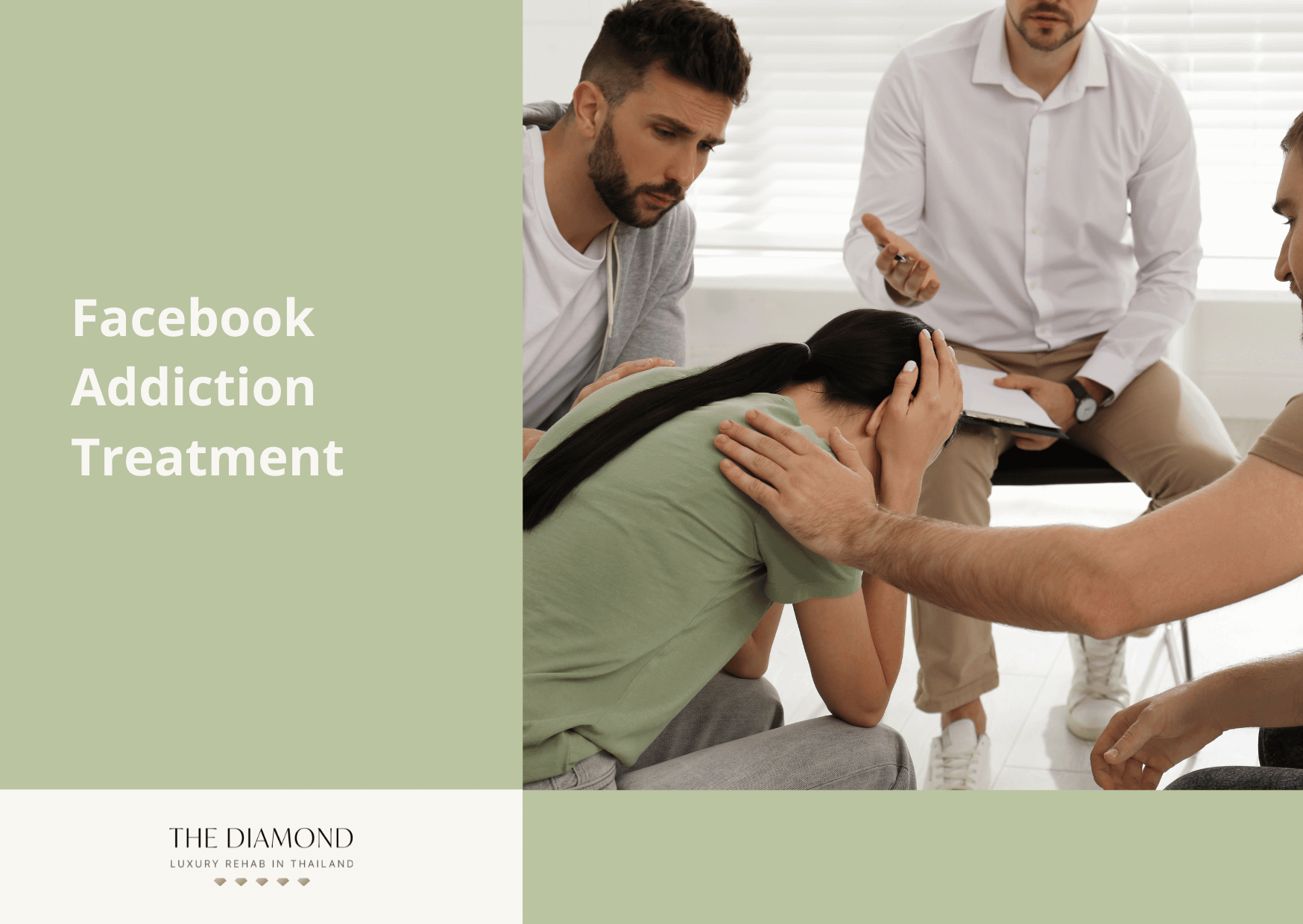
Treating Facebook addiction revolves around therapy sessions, but some people may receive medications for underlying mental health disorders such as anxiety and depression. The main goal of psychological treatment i.e. therapy is to help patients overcome negative thoughts and behaviors by adopting healthier and more positive patterns and coping mechanisms.
Addictions tend to stem from unresolved mental health problems, which is why therapists help patients work on their emotional and psychological well-being so they can prevent relapse and continue using the internet and social media without developing an addiction.
Various types of therapies are involved in the treatment of internet addiction which can be similarly applied to address social media addiction such as Facebook addiction. The most commonly employed approach is cognitive-behavioral therapy (CBT). In a 2022 article published in the International Journal of Mental Health and Addiction, Qutaiba Agbaria, an academic researcher from Al-Qasemi College in Israel, reports that CBT is considered the most effective approach to reducing excessive internet use and improving self-perceptions in persistent users.
Psychological treatment for Facebook addiction may also include behavior modification to establish healthy internet use patterns through dialectical behavioral therapy (DBT). As a form of cognitive-behavioral therapy, DBT aims to identify and change negative thinking patterns and pushes for positive behavioral changes. It is a potential treatment to address problematic interactive media use and has shown promising improvements in targeted self-regulation behaviors and decreasing frequency of interactive media use, according to a 2020 study led by Dr. Emily Pluhar published in the Journal of Psychiatric Practice.
Why is using Facebook addictive?
Facebook is addictive because it activates the brain’s reward center by offering a sense of social acceptance in the form of positive feedback through comments and likes. Facebook is a social media platform where users get to connect with friends and family, share updates, read news and latest developments, and more. This social media platform allows a person to stay in touch with other people and also to know what’s going on in the world. In other words, Facebook has become a “window” through which users observe everything around them.
The main advantages of Facebook are its ease of use and the fact people from different age groups can use it. But disadvantages are also evident in the form of its addictive nature and the tendency to use it as a distraction from real-life problems.
Facebook use may turn into addiction because it offers instant gratification. Supportive comments and tons of likes on status updates and photos serve as an instant confidence boost for many users. As a result, they may crave this kind of affirmation regularly, particularly during stressful situations in their lives. With time, Facebook use becomes a coping mechanism. This leads to dependency and addiction because a person tends to spend an increasing amount of time on Facebook to feel a certain way.
Social media addiction, such as Facebook addiction, can be associated with the fear of missing out. In a 2020 study by M. Kargın et al., published in Perspectives in Psychiatric Care, it was found that fear of missing out or FOMO is a strong indicator of internet addiction. In this situation, a person firmly believes that being disconnected from the platform will result in being left out of the current trends of information. The fear of missing out urges people with Facebook addiction to check and use Facebook more frequently to the point of making it a primary part of their routine. This is why individuals with Facebook addiction jeopardize sleep, work, and real lives in favor of scrolling through Facebook timelines, commenting, posting, and liking other posts.
When is Facebook addiction counseling necessary?
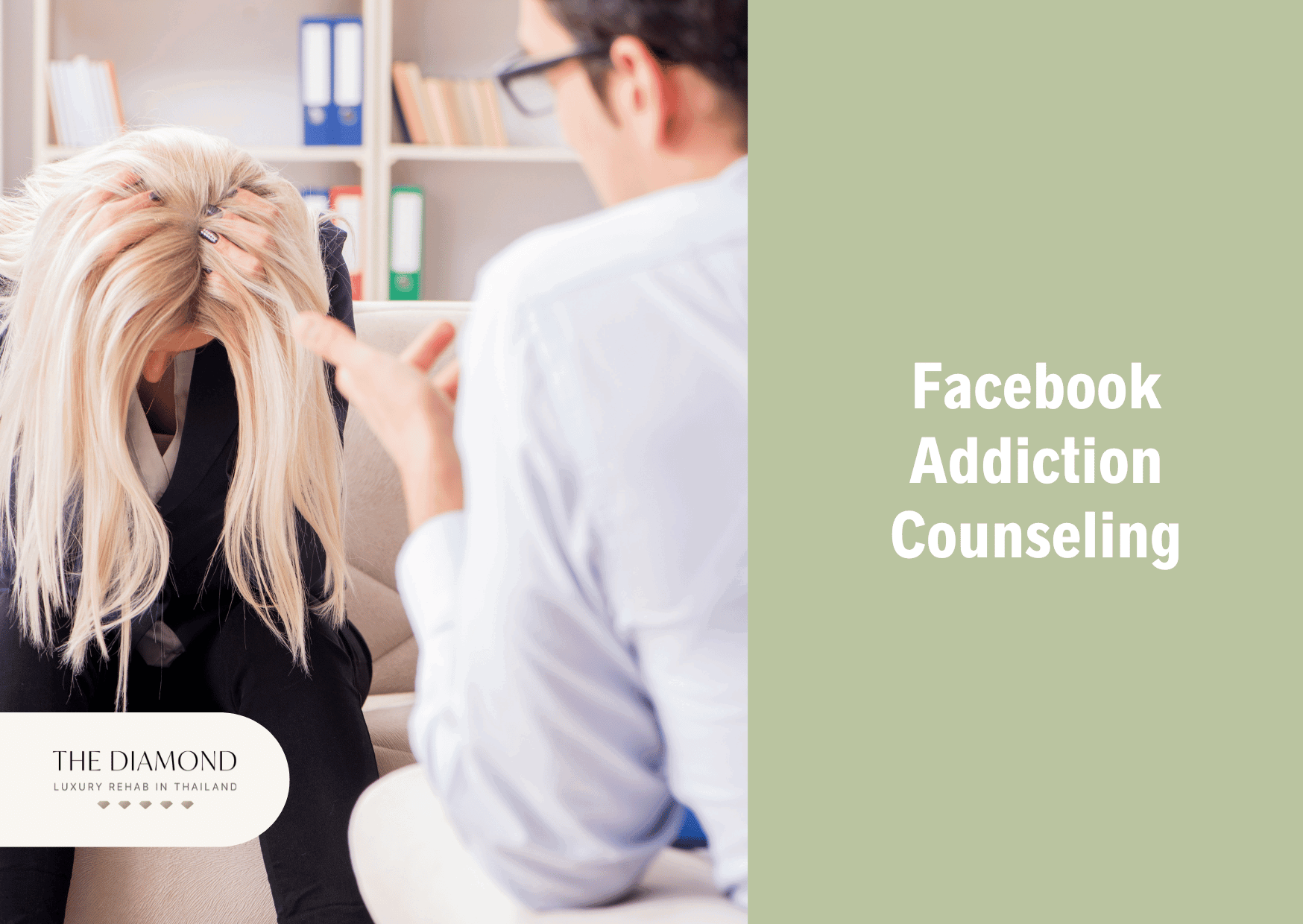
Facebook addiction counseling is necessary when a person finds it difficult to stop or reduce time spent on the platform on their own. Becoming dependent on Facebook and other social media platforms is easier than people believe.
Counseling is also a good choice when the thought of reducing Facebook use causes distress and discomfort in a person. Problematic use of Facebook is a telltale sign a person needs counseling, even if they haven’t developed an addiction just yet. Scheduling a counseling session is also necessary when a person has relationship problems due to excessive Facebook use or their time on the platform harms the quality of life. Impaired mental health due to Facebook use is a good reason to consider counseling. According to a 2014 article published in the Cyberpsychology Behavior and Social Networking journal, by Dr. Igor Pantic, Facebook can boost self-esteem in some people, but significantly reduce it in others.
Therapists help persons with problematic use and Facebook addiction develop strategies to cut back, work through negative emotions resulting from their time on the platform, and find more productive coping mechanisms.
What are the symptoms of Facebook addiction withdrawal?
Symptoms of Facebook addiction withdrawal include irritability and mood swings, anxiety and depression, and insomnia. Additionally, a person going through withdrawal from Facebook addiction may also experience cravings, fatigue, aches and pains, and nausea. Strong cravings to use Facebook are also among the withdrawal symptoms. It’s not uncommon for people to have headaches, diarrhea, restlessness, and difficulty breathing during withdrawal.
In other words, symptoms of Facebook addiction withdrawal are similar to withdrawal from other behavioral addictions and substance use disorders. Withdrawal is usually associated with drug or alcohol addiction, but these symptoms appear with other addictions too. For example, in his 2014 article published in the Cyberpsychology Behavior and Social Networking journal, Dr. Igor Pantic found that even brief abstinence from social media can induce withdrawal symptoms.
The intensity and duration of withdrawal symptoms depend on the severity of addiction to Facebook and the presence of other mental health problems.
What other social media platforms can cause addiction?
Other platforms that can cause social media addiction include Instagram, Snapchat, Twitter, and TikTok. In other words, any social media platform can lead to addiction if a person develops problematic use. According to Statista, an online platform specializing in market and consumer data, global social media use is now at 49% as of January 2020. It is expected to increase considering infrastructure developments in remote areas and the widespread availability of low-cost mobile devices. Meanwhile, as of January 2023, Facebook tops the most popular social network ranked by the number of monthly active users, followed by YouTube, WhatsApp, and Instagram.
